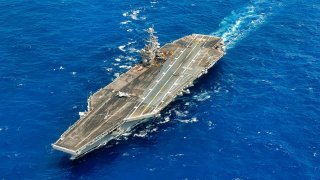Harrison Kass

Summary: The escalating tensions between the US and China in the Indo-Pacific raise concerns about the possibility of conflict, specifically focusing on whether China could sink an American aircraft carrier. China possesses the capabilities to do so, utilizing its submarine fleet and hypersonic missiles. However, China is seen as a rational actor unlikely to take such a drastic step without readiness for all-out war, considering the catastrophic implications of sinking a carrier, including massive loss of life and expertise, significant financial losses, and the potential to spark a global conflict. The US response to such an act could escalate into open military conflict, risking World War III.
Much attention has been paid to the possibility of conflict between the US and China. As China rises and the US grips to the status quo in the Indo-Pacific, the likelihood of conflict rises.
Accordingly, pundits are considering what an actual conflict might look like.
One premise that keeps popping up is the sinking of an American aircraft carrier patrolling Indo-Pacific waters. The sinking of an aircraft carrier would be catastrophic – in terms of the event itself, and in term of the inevitable response. Let’s consider what the sinking of an American aircraft carrier might entail.
But first, let’s consider whether the Chinese possess the capability to sink an aircraft carrier in the first place.
How China Would Do What Would Be The Unthinkable
Short answer: yes.
While an aircraft carrier is a hulking and formidable vessel, it is still a manmade object, engineered from steel and screws. Sinking an aircraft carrier is no easy task – not even when aircraft carriers were relatively simple, as demonstrated in World War II’s Pacific theater. But an aircraft carrier can break. And China has a variety of options for breaking an aircraft carrier.
China’s first option for sinking an aircraft carrier is a submarine fleet, consisting of both nuclear-powered and diesel-electric-powered submarines. Although submarines are relatively cheap compared to an aircraft carrier, submarines do have the ability to sink a carrier – as the French Rubis demonstrated recently, in theory, during a Franco-US war game.
China’s second option is a stockpile of hypersonic missiles. At present, America lacks the ability to defend against hypersonic missiles – a fact that has war planners urgently scrambling to close the missile gap and develop a defense mechanism.
Would the Chinese sink an aircraft carrier?
China is a rational actor who has methodically built up her armed forces – and methodically struck out into neighboring oceans, and Asia, and Africa, and the world at large. While China has irritated nearly every one of her neighbors, and put the world’s leading nations on high alert, China has done so while avoiding direct conflict. The point is, China seems poised, calculating, and far-seeing and are unlikely to do something impulsively, or with unintended consequences. Sinking an American aircraft carrier would be one of the most consequential geopolitical acts in modern history; sinking an American aircraft carrier, before war had been declared, would be likened to Pearl Harbor or September 11th – which China understands. So, like the Japanese bombing Pearl Harbor, or Al Qaeda piloting passenger aircraft into the World Trade Center, China would only sink an aircraft carrier if they were ready for all-out war with the world’s most well-funded, and most experienced, military.
The immediate significance of sinking an aircraft carrier
The most immediate significance stemming from a downed aircraft carrier would be the loss of life. US supercarriers house upwards of 5,000 sailors. The weapon's impact, originating from a submarine or a hypersonic missile, does not have the potential to kill all sailors aboard a carrier (assuming the weapon is conventional and not nuclear), but the sinking itself does. Every sailor on a sinking vessel is acutely at risk of drowning or being lost at sea.
The sinking of an aircraft carrier would likely be a mass casualty event – with loss of life surpassing the two to three thousand killed on September 11th, or during the twenty-year Afghanistan War.
The hypothetical casualties would not only represent a wide-scale loss of life, but a wide-scale loss of expertise. The training and knowledge to run an aircraft carrier (and fly the nearly one hundred advanced aircraft aboard an aircraft carrier) does not come cheap, easily, or quickly. Relatedly, the aircraft carrier itself represents a multi-billion dollar investment. The aircraft aboard an aircraft carrier – F/A-18 Super Hornets, F-35 Lighting II, etc. – represent multi-million dollar investments. The fiscal loss from an aircraft carrier sinking would number in the billions. Constructing a replacement vessel and replacement aircraft – and training the crew to operate said vessel and aircraft – would cost billions and take years. In fiscal terms, losing an aircraft carrier would be catastrophic.
How would the US react?
The most damaging aspect of a scenario in which the Chinese sink a US aircraft carrier would be the US reaction. The US would likely stand its ground or perhaps surge forward, declaring war formally. Either way, the outcome probably entails an open military conflict between the world’s two most powerful nations.
Such a conflict has immense potential for loss of life and loss of resources. The outcome would dictate nothing less than the global world order, with the potential to draw in third parties, including Russia, Japan, the Koreas, India, and NATO. The result could feasibly be World War III.
No comments:
Post a Comment